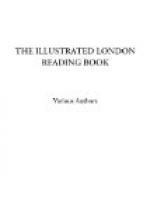Atheism, by which I mean a disbelief of a Supreme Being, and consequently of a future state, under whatsoever title it shelters itself, may likewise very reasonably deprive a man of this cheerfulness of temper. There is something so particularly gloomy and offensive to human nature in the prospect of non-existence, that I cannot but wonder, with many excellent writers, how it is possible for a man to outlive the expectation of it. For my own part, I think the being of a God is so little to be doubted, that it is almost the only truth we are sure of, and such a truth as we meet with in every object, in every occurrence, and in every thought. If we look into the characters of this tribe of infidels, we generally find they are made up of pride, spleen, and cavil: it is indeed no wonder that men who are uneasy to themselves, should be so to the rest of the world; and how is it possible for a man to be otherwise than uneasy in himself, who is in danger every moment of losing his entire existence and dropping into nothing?
The vicious man and Atheist have therefore no pretence to cheerfulness, and would act very unreasonably should they endeavour after it. It is impossible for any one to live in good-humour and enjoy his present existence, who is apprehensive either of torment or of annihilation—of being miserable or of not being at all.
After having mentioned these two great principles, which are destructive of cheerfulness in their own nature, as well as in right reason, I cannot think of any other that ought to banish this happy temper from a virtuous mind. Pain and sickness, shame and reproach, poverty and old age; nay, death itself, considering the shortness of their duration and the advantage we may reap from them, do not deserve the name of evils. A good mind may bear up under them with fortitude, with indolence, and with cheerfulness of heart. The tossing of a tempest does not discompose him, which he is sure will bring him to a joyful harbour.
A man who uses his best endeavours to live according to the dictates of virtue and right reason, has two perpetual sources of cheerfulness, in the consideration of his own nature and of that Being on whom he has a dependence. If he looks into himself, he cannot but rejoice in that existence which is so lately bestowed upon him, and which, after millions of ages, will be still new and still in its beginning. How many self-congratulations naturally arise in the mind when it reflects on this its entrance into eternity, when it takes a view of those improvable faculties which in a few years, and even at its first setting out, have made so considerable a progress, and which will be still receiving an increase of perfection, and consequently an increase of happiness! The consciousness of such a being spreads a perpetual diffusion of joy through the soul of a virtuous man, and makes him look upon himself every moment as more happy than he knows how to conceive.




